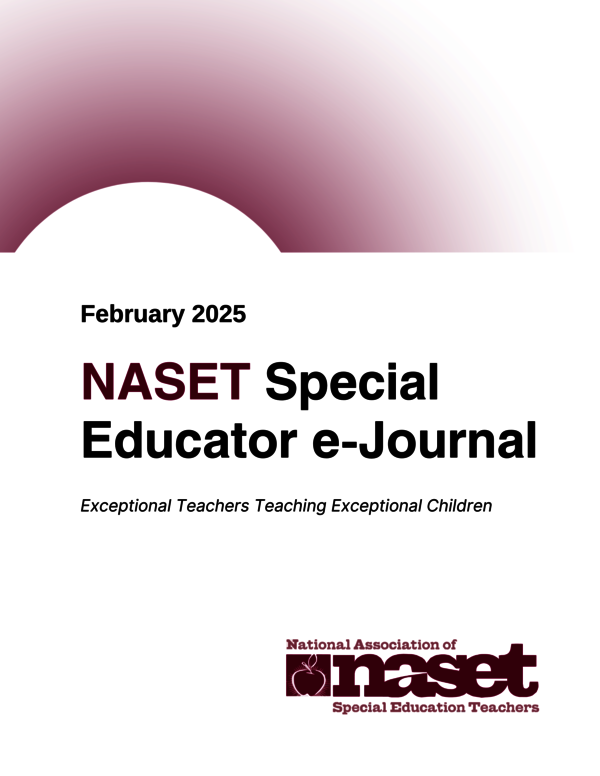February 2025 - Special Educator e-Journal

Download a PDF Version of This e-Journal
NASET Members - Login to Access
Not a Member? - Join NASET Today!
Table of Contents
- Special Education Legal Alert. By Perry A. Zirkel
- Buzz from the Hub
- Normalizing Nonverbal Behaviors in Autistic Individuals Through Technology: A Theoretical Analysis of the Connection to AI and Technology Use in Higher Education. By Melissa Wells, Ed.D., BCASE, BCISE
- Exploring the Relationship Between Collaborative and Experiential Teacher Training Models and Academic Achievement for Students with Disabilities: A Literature Review. By Yasman Cortes, Florencia Pecorari, Lournellie Vega Rullan, and Sarah Tiilikka
- 10 Essential Qualities and Characteristics of Effective Special Education Teachers
- Latest Employment Opportunities Posted on NASET
- Acknowledgements
NASET Members - Login Below to access the latest Special Educator e-Journal.
Site visitors: You may access a sample e-Journal - Sample e-Journal
Special Education Legal Alert
By Perry A. Zirkel
© January 2025
This month’s update identifies two recent court decisions that respectively revisit (a) the IDEA’s oft-overlooked state complaint process and (b) Section 504/ADA in relation to a child with misophonia. For previous monthly updates and related publications, see perryzirkel.com
NASET Members - Login to Access the Full Article
Not a Member? - Join NASET Today!
Buzz from the Hub
Non-Regulatory Guidance Supporting High-Quality Preschool with Title I Funds: Guidance to Local Educational Agencies and Schools on Implementing the Required Head Start Program Performance Standards for Title I-Funded Preschool Programs
Employment Checklist for Students (Ages 14-22) with Disabilities
Voluntary Self-assessment for States to Support Military-connected Children with Disabilities and Their Families Under the IDEA.
Supporting Military Families
And Many More Articles
NASET Members - Login to Access the Full Article
Not a Member? - Join NASET Today!
Normalizing Nonverbal Behaviors in Autistic Individuals Through Technology: A Theoretical Analysis of the Connection to AI and Technology Use in Higher Education
Melissa Wells, Ed.D., BCASE, BCISE
Abstract
This paper explores the theoretical underpinnings of technology normalization in public spaces and educational settings for individuals with autism, focusing on the role of iPads as augmentative and alternative communication (AAC) devices in PK-12 and the adoption of artificial intelligence (AI) in higher education. Both iPads for communication and AI tools in educational settings represent a broader societal shift toward technological inclusion and accessibility, addressing unique needs in specific age groups. By situating these technologies within communication theory, inclusion theory, and technological determinism, this paper examines how they contribute to a growing culture of inclusivity and accessibility. This theoretical framework provides insight into the parallel ways in which AAC in PK-12 and AI in higher education reshape societal norms, enhancing participation and support across diverse educational settings.
Keywords: Assistive technology, artificial intelligence, communication theory, inclusion, autism spectrum disorder, higher education, PK-12 education
Exploring the Relationship Between Collaborative and Experiential Teacher Training Models and Academic Achievement for Students with Disabilities: A Literature Review
By
Yasman Cortes, Florencia Pecorari, Lournellie Vega Rullan, and Sarah Tiilikka
Florida International University
Abstract
This literature review examines collaborative and experiential teacher training models and their impact on student achievement. Research supports the effectiveness of collaborative approaches like Professional Learning Communities (PLCs) and co-teaching in enhancing instructional practices. Experiential methods, including simulations, case studies, and fieldwork, increase teacher confidence in addressing diverse learning needs. The review highlights the need for further research to strengthen the evidence base and guide effective program design for inclusive education.
Keywords: collaborative learning, experiential learning, co-teaching, teacher preparation, special education teacher training, student achievement, evidence-based practices
NASET Members- Login to Access the Full Article
Not a Member? - Join NASET
10 Essential Qualities and Characteristics of Effective Special Education Teachers
Introduction
Special education teachers play a crucial role in shaping the lives of students with diverse learning needs. Their work requires a unique blend of skills, qualities, and personal characteristics to meet the challenges of the profession effectively. Beyond mastering instructional strategies, special education teachers must foster patience, empathy, and adaptability to support students with disabilities and create an inclusive learning environment. These educators must also collaborate with families, colleagues, and specialists to ensure each student receives personalized support tailored to their individual goals. Below are 10 essential qualities and characteristics of effective special education teachers, explained in detail, to highlight what makes them so impactful in the lives of their students.
NASET Members - Login to Access the Full Article
Not a Member? - Join NASET Today!
Latest Employment Opportunities Posted on NASET
* Blumberg Center Project Director - Indiana State University is looking for candidates to fill a leadership position within the Bayh College of Education’s Blumberg Center for Interdisciplinary Studies in Special Education. To learn more- Click here
* Middle School Intervention Specialist - K12, a Stride Company, believes in Education for ANY ONE. We provide families with an online option for a high-quality, personalized education experience. Students can thrive, find their passion, and learn in an environment that encourages discovery at their own pace. To learn more- Click here
Acknowledgements
Portions of this or previous month’s NASET’s Special Educator e-Journal were excerpted from:
- Center for Parent Information and Resources
- Committee on Education and the Workforce
- FirstGov.gov-The Official U.S. Government Web Portal
- Journal of the American Academy of Special Education Professionals (JAASEP)
- National Collaborative on Workforce and Disability for Youth
- National Institute of Health
- National Organization on Disability
- Substance Abuse and Mental Health Services Administration
- U.S. Department of Education
- U.S. Department of Education-The Achiever
- U.S. Department of Education-The Education Innovator
- U.S. Department of Health and Human Services
- U.S. Department of Labor
- U.S. Food and Drug Administration
- U.S. Office of Special Education
The National Association of Special Education Teachers (NASET) thanks all of the above for the information provided for this or prior editions of the Special Educator e-Journal